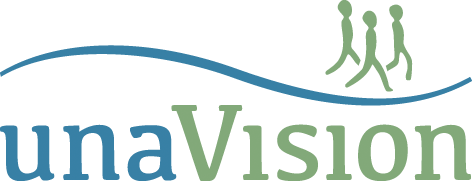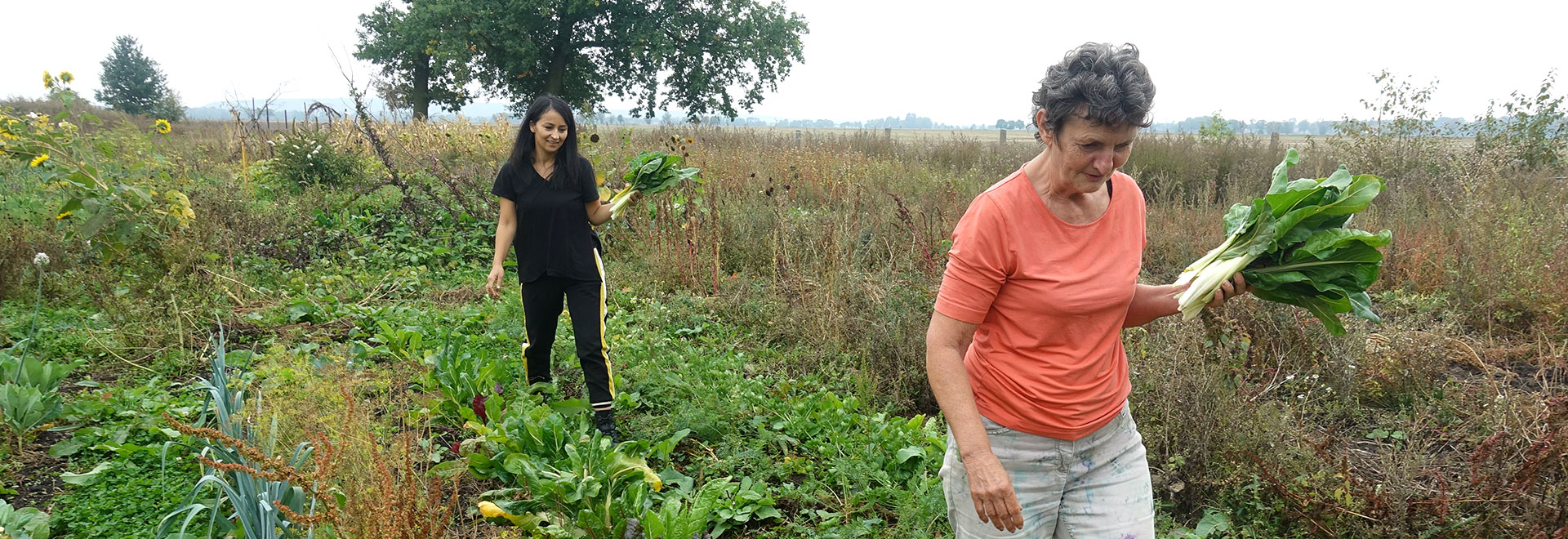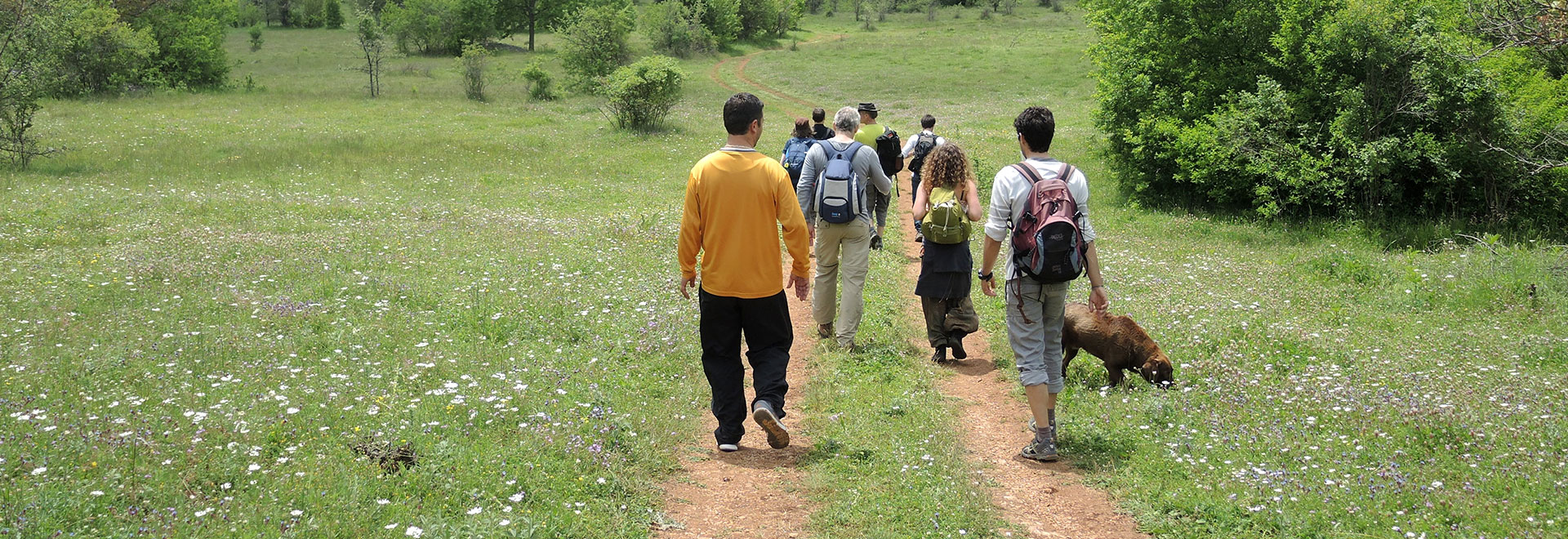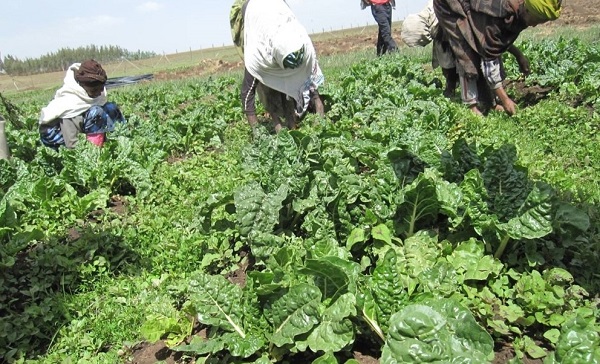Environmental Sustainability, Water and Agroforestry with Permaculture for Gircha in Ethiopia
Near the Gricha agricultural research centre of the University of Arba Minch a site of 90ha is planned to be recultivated with agro-forestry in permaculture. Houses for 150 – 500 people will be built from natural material. The region was identified during an UnaVersity Research Journey in October 2017. During a community assessment in 2018 families and many stakeholders of the region were visited and interviewed. A design challenge was held at the University of Arba Minch in March 2018 and 4 teams from Addis Ababa and Arba Minch participated in the competition. The UnaVillage Gircha in Ethiopia is supported by Arba Minch University (AMU) and Rotary International.
AIM:
The central aim of this project in the "Environment" Area of Focus (AoF) is education about rain water harvesting using agroforestry with permaculture including improvement of the soil. It takes place in a part of Ethiopia that is severely affected by erosion by wind and water. The project will reverse the erosion and raise the level of the ground water. This follows the Area of Focus Statement of Purpose and Goals: "Supporting strategies and targeted initiatives to improve aquifer and groundwater recharging, water conservation, water quality, sanitation, and watershed management (adhering to the policy statements and guidelines for the water, sanitation, and hygiene area of focus)" and the slogan: "Take care of your soil, then your soil will take care of you."
EXPLANATION OF TERMS:
Rainwater harvesting means keeping the rainwater on the project site. Different shapes and sizes of structures from stones, sticks and soil are used depending on the steepness of the slope and the amount of rain expected (see appended drawing of a swale).
Agroforestry means the combination of trees and lower food crops for benefiting each other.
Permaculture means stopping and reversing the degradation of the soil and improving its quality, permanently covering the soil with plants and selecting combination of plants that benefit from each other as well as including respecting and improving the microbiome and animal contents of the soil.
SUPPORTING THE PROJECT:
You can also help supporting this by spreading this link and contributing yourself to it:
https://www1.plant-for-the-planet.org/amu-ecovillage-project
Contributions are TAX deductible in Germany.
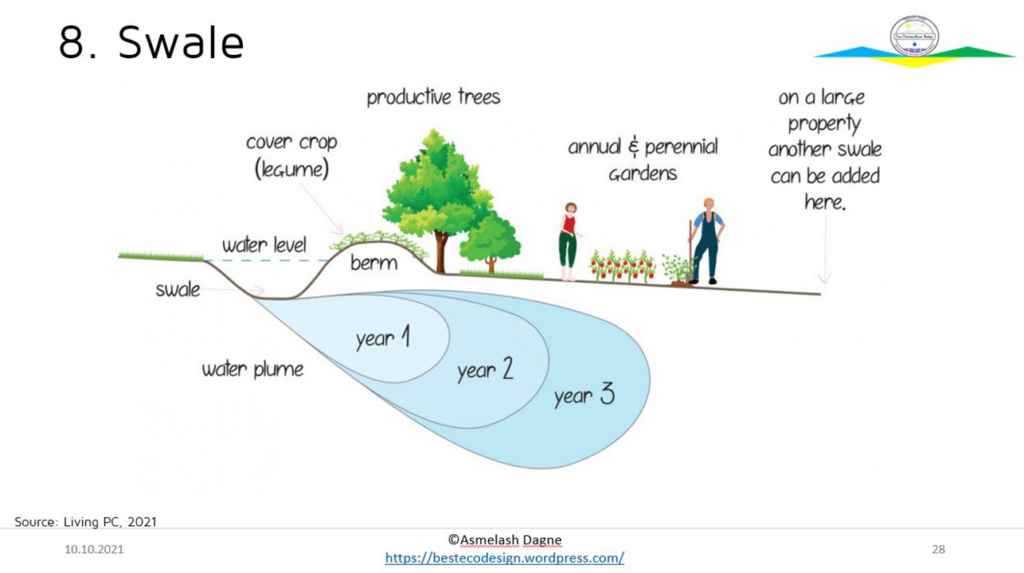
PRESENT SITUATION:
People in the project region suffer from degradation of their soil by erosion from rain and wind due to deforestation, over grazing and monoculture. They see the need of improvement of their soil management and ask for education and a space for exchanging experiences with others and getting good advice from experts. This will be provided by the project.
An in-depth community assessment was done from January to March 2018. It was prepared by interviews with stakeholders and experts from September 2017 onward and included standardized interviews of 28 representatively selected community members from February 4th to February 10th 2018. Based on this evaluation a design challenge was advertised and 4 expert teams (2 from Addis Ababa and 2 from Arba Minch) presented their proposals during a summit from March 15th to 17th 2018 in front of members of the community and the university at Arba Minch University (AMU). The community assessment was reassessed in 2021 with no relevant changes to the situation besides increasing degradation of the soil and urgent need for action.
PROJECT IMPACT:
Based on these results the project is designed including vocational training parts that will improve the project area while delivering information and experience at the same time. It follows a holistic approach explicitly recommended for the "Environment" Area of Focus (page 19 paragraphs 4a, 4b and 4c and twice on page 20).
Deforestation, over grazing and monoculture will be reversed as the central education of the project is rain water harvesting using agroforestry with permaculture including improvement of the soil: Deforestation and monoculture will be reversed by planting biodiverse trees and lower crop plants. The devastating erosion will be reduced by constructing a swale and horizontal rows adapted to the steepness of the slope (see pictures).
Over-grazing will be reversed step-by-step with step-by-step including more land into the agroforest. This will be done in close connection with the community by integrating them into the trainings, explaining the aims and processes with educative posters and by the guardians in the education center. This will be supported by using the good relationship to the community of the Institute of Culture and Language Research of AMU.
Community dialogues and including stake holders and local leaders will inspire the local community to sustain and enlarge the results of the project. The area for it will be prepared before the training and it will be holistically supplemented by an education about building houses from natural local material as or similar as described by the results of the design challenge with good sanitation (as Arborloo see picture). The construction of the 2 buildings is paid for with non-Rotarian funds. Just the training is co-funded by the Rotary Foundation with little material costs used for the training itself.
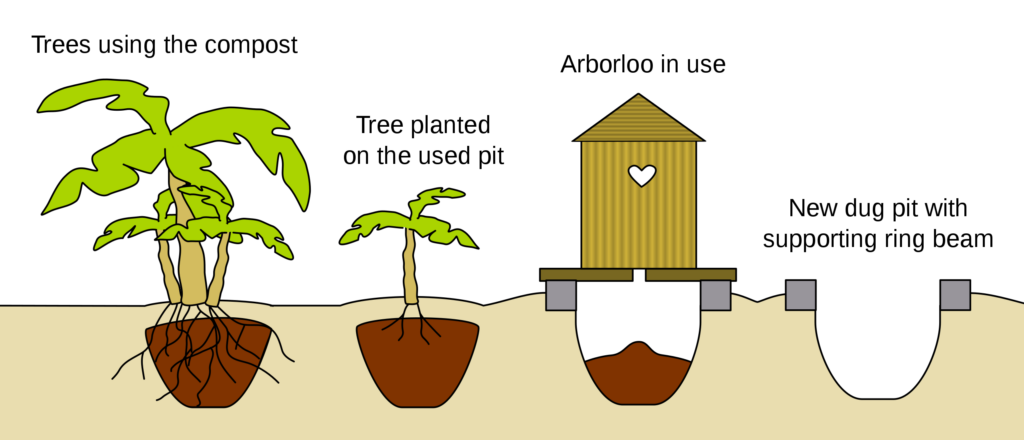
This picture about the Arborloo is from the Wikimedia Commons: https://en.wikipedia.org/wiki/File:Arborloo-en.svg
Main training:
The main vocational training is about rain water harvesting using agroforestry with permaculture. It is prepared by building a swale and terraces (see pictures). During the training they will be secured with trees and improved quality of the soil. The swale and the terraces will subsequently recharge the groundwater. A fence will protect the plants from animals. All of this will minimize erosion, elevate the level of groundwater and store CO2 from the atmosphere in wood and soil. Some elements of it are based on local traditions that have been forgotten during the switch to monoculture in the past. Harvested crops will feed the local community and can be sold by a new cooperative to be established during the project. This concept of including new and traditional cultivation methods will increase retention of water on the fields, minimize cost of seeds, reduce the agricultural risks by increasing diversity and avoid synthetic fertilizers and pesticides. In a "train the trainer" approach, we especially address "Local Governance Agents for Agriculture" as trainees for this in order to maximize the multiplying effect of it. We also select trainees by their ability to teach and prefer women.
Additional trainings:
The training about sustainably building houses from natural local material implements an innovative cradle-to-cradle approach. Trainees are split into 3 groups: "Block makers", "Masons" and "Finishing workers". Besides learning about sustainable construction techniques, trainees will use and improve their new skills by starting with two buildings: an educational building for exhibiting educational posters and exchanging experiences and a house to be inhabited by the guardian family of the project site. The educational posters to be exhibited in the educational building will be about rainwater harvesting, agroforestry, Terra preta, permaculture, health, family planning and so on. They will be developed during the trainings and will be translated into English and local languages. These educational posters will be presented to the public is several ways: After every training the trainees will receive their diploma in a public ceremony held at the educational center which includes explaining the posters. As local people and their children are busy working in their fields during daytime, most educational meetings take place in the dark with demand of electricity. The high demand for electric light was especially mentioned by women during the community assessment. It also follows the Area of Focus Policy Statement for environment 4.a.: "Providing access to locally sourced, renewable energy, including solar, methane-capture, and small-scale wind and hydropower systems, as part of holistic interventions to mitigate climate change and disruption". Therefore, the project will install a solar power plant placed on top of the roof of the educational center and provide lamps in good quality with rechargeable batteries to share for every group of households donated to the women. They are asked to return their batteries for recharging to the educational center. This makes the women return to the educational center regularly, meet other women and read the exhibited posters. At least 6 local people will be instructed for maintenance of the solar power plant. The lights will also enable children to do their homework at dark and help women to feel more secured.
The Area of Focus Policy Statement for environment 4.b. is also addressed: "Providing clean-cooking technologies as part of a holistic approach to reduce or eliminate the burning of biomass and fossil fuels that results in deforestation, degraded land, or increased air pollution" together with 8.b: "Eliminating and reducing exposure to environmental toxins in homes, schools …". Therefore, an exemplary stove will be installed in the kitchen of the education center and the house of the guardian family.
The public events of handing over the diplomas, opening of the educational center and explaining the posters will also include promoting the establishment of a cooperative that will continue and expand the good results of the project after funding has finished including financing the salary of two guardians. Additional regular meetings will be held in the education center at dark about establishing the cooperative, using a transformative learning approach and continuing even when the cooperative is established and funding has ended.
BENEFICIARIES:
The benefiting communities are in Kogota Woreda in Gamo Gofa Zone of the region "Southern Nations, Nationalities and Peoples". The main benefiting communities are the kebeles Ezzo Tula and Ezzo Otte. The surrounding kebeles will benefit as well as kebeles Ezzo Gindo and Ezzo Woro. For the vocational trainings we prefer women and aim at having at least as many female trainees as male trainees. For gaining the maximal impact trainees are also selected looking at their ability to teach and deliver inspiration and information to others.
Here is a Film about the project in German:
https://www.youtube.com/watch?v=uFYkn0wbff8
